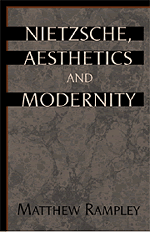Book contents
- Frontmatter
- Contents
- List of Abbreviations
- Acknowledgements
- Introduction
- 1 Truth, Interpretation and the Dialectic of Nihilism
- 2 Nietzsche's Subject: Retrieving the Repressed
- 3 Laughter and Sublimity: Reading The Birth of Tragedy
- 4 Wagner, Modernity and the Problem of Transcendence
- 5 Memory, History and Eternal Recurrence: The Aesthetics of Time
- 6 Towards a Physiological Aesthetic
- 7 Art, Truth and Woman: The Raging Discordance
- 8 Overcoming Nihilism: Art, Modernity and Beyond
- Notes
- References
- Index
1 - Truth, Interpretation and the Dialectic of Nihilism
Published online by Cambridge University Press: 18 March 2010
- Frontmatter
- Contents
- List of Abbreviations
- Acknowledgements
- Introduction
- 1 Truth, Interpretation and the Dialectic of Nihilism
- 2 Nietzsche's Subject: Retrieving the Repressed
- 3 Laughter and Sublimity: Reading The Birth of Tragedy
- 4 Wagner, Modernity and the Problem of Transcendence
- 5 Memory, History and Eternal Recurrence: The Aesthetics of Time
- 6 Towards a Physiological Aesthetic
- 7 Art, Truth and Woman: The Raging Discordance
- 8 Overcoming Nihilism: Art, Modernity and Beyond
- Notes
- References
- Index
Summary
Negation and annihilation are conditions of affirmation
(EH ‘Why I Am a Destiny’ §4)Nietzsche's writing consists of a radical scepticism towards all forms of philosophical thought. However, it differs from that of, say, David Hume, often seen as an exemplar of philosophical scepticism. This does not simply imply that they were different writers, focused on differing issues, united only by a common mistrust of the limitations of human knowledge and science. I am not concerned with the divergences between the details of their projects as much as with the fundamentally different bases from which they launch their sceptical attacks on knowledge. Hume, despite his sceptical regard towards the rational, remains firmly within the circumscribed boundaries of metaphysical discourse. His mistrust of the notion of causality, for example, stems from the suspicion that it constitutes a misrepresentation of what really is the case. Bound to the Empirical tradition from Bacon onwards, his contention is that since our knowledge of the world is derived from the mere succession of sense stimuli from without, all attempts to organise those stimuli into a meaningful whole are synthetic acts, revealing little or nothing about the reality underlying those stimuli, unable even to predict whether those stimuli will be the same tomorrow. For example, his claim in A Treatise of Human Nature that ‘all our reasonings concerning causes and effects are deriv'd from nothing but custom’ draws its force from the sense of distance between the picture of the world based on habit, and what might really be true of it.
- Type
- Chapter
- Information
- Nietzsche, Aesthetics and Modernity , pp. 13 - 49Publisher: Cambridge University PressPrint publication year: 1999



